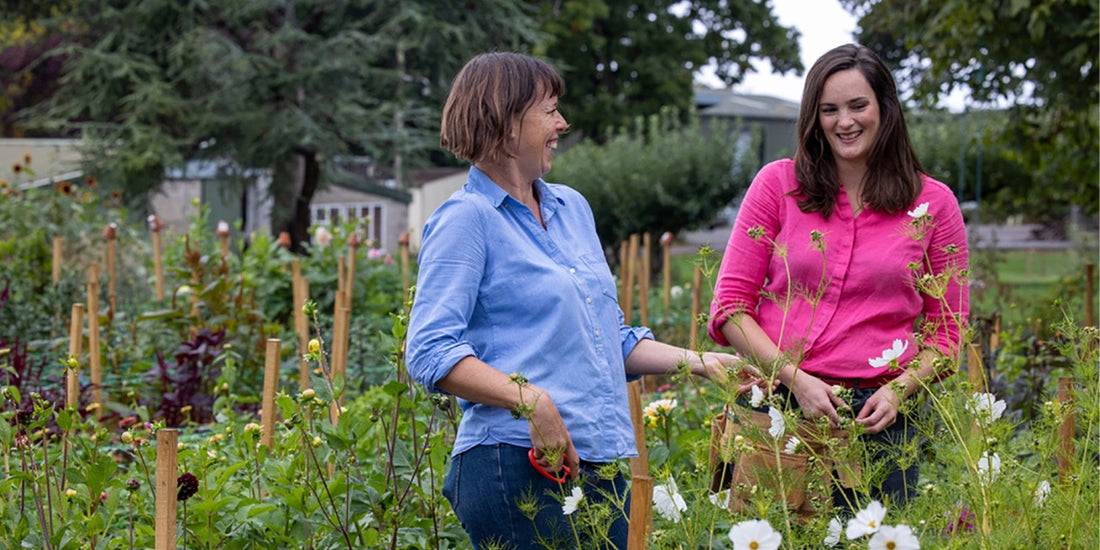Just over 18 months ago, The Wild Zinnia moved on to a plot at The Elms Farm, on the outskirts of Bristol, 50 metres from the JUNO office. Before then, three shipping containers sat on this modest patch of partially tarmacked land. Now it flourishes with beautiful, fragrant British flowers grown for the ever-expanding sustainable cut flower market. This is all thanks to the hard work of Debs and Roz, two friends who set up the business during lockdown.
It all started on an allotment in Bristol. Debs and Roz have adjacent patches where they had been growing vegetables for years. At the end of one growing season, they experimented with growing chrysanthemums, dahlias and zinnias for the first time, and fell in love with their intricacies. They wondered whether they might be able to sell them, and found there was real interest in flowers that had been grown locally and organically. Lockdown hit shortly after, and the allotment became a sanctuary for their families.
“We were there all day, every day. It was somewhere we could go where our children had space to be outside,” Debs tells me. During this period, they grew more flowers, and began to see that it might be something they could do for a living.
Three years on, the business is thriving. While they still use their allotments, taking on the farm has given Debs and Roz much more capacity. They grow flowers for weddings, events and funerals, as well as making bouquets for gifts and selling wholesale to florists. They also run workshops and invite customers to visit the farm for pick-your-own. Debs shows me around and I am struck by how neat and organised the beds are. There are crates of grasses grown in rows so as not to be mistaken for wild grasses that have seeded themselves, sunflowers just beginning their journey skyward, gypsophila, forgetme-nots, ranunculi – everything beautifully labelled. Debs explains the meticulously planned timetable that means there is a constant supply of ready-to-harvest flowers. Once one annual has flowered, it’s cleared to make room for the next.
“They say you should spend a year in a garden before you grow anything, and really it’s the same here,” Debs comments as we wander up and down the beds. “Those foxgloves will have to move back a couple of metres next year as they just don’t get enough shade.” And she points out the magnificent walnut tree that looms over one side of their plot. With its extensive root system, it draws water away from anything planted to that side, far more than they had anticipated.
Debs and Roz’s vision when setting up The Wild Zinnia, was to produce beautiful, fragrant, seasonal British flowers that mean something to people and tread lightly on the planet. “We don’t use any chemical pesticides or fertilisers,” Debs says, “but we do spend a fortune on ladybirds! Ladybirds are fantastic at controlling aphid populations.”
“When we took on this plot,” Roz explains, “because it had been covered by shipping containers, there was nothing in the soil.” They participated in Plant Your Pants, an initiative that measures soil health. You bury a pair of cotton pants in the soil and leave them there for microorganisms to feed on. When you dig up the pants eight weeks later, in healthy soil, you’ll find just the elastic left. “When we did it,” Roz says, “they were exactly the same.” They are planning to do the experiment again now to see how things have changed. “At first, we had no slugs even, but the biodiversity of the patch is improving. There’s so much in the soil now.” This brings with it new challenges. “We had a tough spring with a leatherjacket infestation, which eat through roots. There are no quick fixes, but you just have to trust that at some point, nature will bring things back into balance.” This is what it means to tread lightly. Debs and Roz see themselves as caretakers of the land. They add leaf mould, manure and seaweed to the soil, knowing that they are leaving behind more than they are taking out.
The big difference between imported flowers and the majority of field-grown British flowers is that imported flowers are bred, grown, picked and conditioned to maximise the volume that can be transported. Roz explains: “Herbicides and pesticides are used to reduce crop loss, they’re picked in tight bud to aid transportation and treated with preservatives to extend life. The emphasis on yield, stem length and vase life often comes at the expense of fragrance, movement and a more natural feel that is so prized by floral designers today. Local, field-grown, seasonal British flowers will always be the most sustainable choice as there is almost no carbon footprint.
“Sometimes florists can be surprised by the price of our tulips when imported tulips are so much cheaper, but they’re not comparable. Our tulips are big and blousy and fragrant with interesting textures and huge heads.” The Wild Zinnia can’t compete with the scale of massproduced cut flowers, and it’s not trying to, focusing instead on quality and speciality.
Flowers from the Farm is a network of artisan growers across the UK, which champions seasonal, scented, locally grown cut flowers. “It’s such a supportive and knowledgeable community to be part of,” Debs says, “and the easiest way for the public to find their most local flowers, or to find flowers local to where they would like them sent.” It was through Flowers from the Farm that The Wild Zinnia came to be part of the coronation. “Seasonal flowers from growers nationwide were used. It was a huge moment to show that British flowers could be used for such an important and historic state occasion – and on such scale.”
Debs and Roz are learning all the time about how to make the business more efficient and sustainable, and how to balance the demands of time-critical work with family life. “We have refined our colour palette so that everything that grows can be picked together. It makes harvesting easier because everything goes with everything else.” Both women were teachers originally. “We gave up our jobs because we wanted this to be something we could fit around our families, so it was important to us to make it work.” In many ways, they have achieved this, but they are more aware of the demands of the business now. “Everything with flowers is so time-sensitive,” Roz says, “and it’s not always possible to drop everything just because something needs to be picked.” Debs agrees: “It’s a blessing having two of us. Doing this as a sole trader would be really difficult because you just couldn’t go away.” The watering alone is a huge commitment.
“It’s exciting for our children though,” Roz says. “When they’ve helped us with planting, it’s wonderful to be able to tell them when those flowers have been harvested. And it’s a really tangible way of showing them how to earn a living. They begin to appreciate the value of things because if we snap a stem, that flower won’t grow, and we lose the money we would have made on it.”
I ask Debs and Roz whether everything has gone to plan since they set up the business. They laugh. “Everything seems to present a challenge! We have a lot of rocks underneath the surface so even putting up our polytunnel was a huge challenge as we had to dig about 20 trenches for the foundations.” But the biggest challenge is the weather. “This year, spring was long and cold, so everything was late. People ask us if we'll have ranunculi in April, and it’s hard to say for sure. We can look back at our notes and spreadsheets from previous years to give us an idea, but every year is different. Experienced growers finish the season at the end of October. Things will still grow beyond then, but there’s the risk of frost and it just takes so much management that it becomes really stressful. November is a busy planting month anyway. We’ll be here in our waterproofs, covered in mud.”
It’s hard to imagine it as we sit among the opulent beds in the warm summer sun. It’s a reminder of the rhythm of the seasons. By then, no doubt, autumn will be welcome, but for now, I will enjoy taking in the bounty of The Wild Zinnia as I make my way to the JUNO office.
____
Find out more about The Wild Zinnia at thewildzinnia.com and on Instagram @wildzinniabristol, or visit flowersfromthefarm.co.uk to discover flower growers local to you.
Photography by Anna Barclay On Instagram @annabarclayphotos
Alice Ellerby is sub-editor at JUNO.



